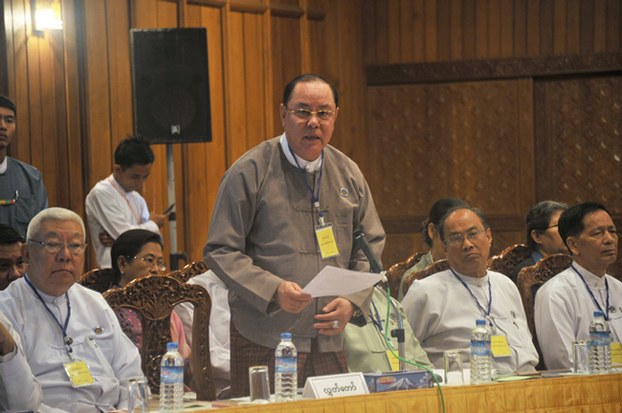Myanmar's upper house begins discussing education law amendments
| Publisher | Radio Free Asia |
| Publication Date | 24 March 2015 |
| Cite as | Radio Free Asia, Myanmar's upper house begins discussing education law amendments, 24 March 2015, available at: https://www.refworld.org/docid/552e198d15.html [accessed 26 May 2023] |
| Disclaimer | This is not a UNHCR publication. UNHCR is not responsible for, nor does it necessarily endorse, its content. Any views expressed are solely those of the author or publisher and do not necessarily reflect those of UNHCR, the United Nations or its Member States. |
2015-03-24
 A Myanmar lawmaker (C) speaks during a meeting to reform the national education law at the parliament building in Yangon, Feb. 11, 2015. AFP
A Myanmar lawmaker (C) speaks during a meeting to reform the national education law at the parliament building in Yangon, Feb. 11, 2015. AFP
Myanmar's upper house of parliament began discussions today on amendments to the controversial education law, as authorities released 20 people arrested earlier this month during a brutal police crackdown on students and others protesting against the current legislation.
Eight lawmakers in the upper house want to include specific changes to the current education law such as the teaching of English in elementary school and instruction in agriculture, animal husbandry and ethnic languages.
"People have passed high school and graduated from universities, but can get only basic level jobs," J. Yaw Wu, a National Unity Party lawmaker who represents Kachin state's 12th constituency, told RFA's Myanmar Service. "If we find jobs in foreign countries, we can only get very low-level labor jobs.
"This education system pushes us to be slaves in other countries. I would like to discuss allowing students from the countryside who are too far away from the main states to study at military and police academies and institutes."
Other lawmakers said they advocated early instruction in the English language and a more inclusive University Council.
"I would like to discuss not having narrow-minded attitudes such as only my language is important, as the world becomes a global village and English should be taught from kindergarten to the university level," said Paw Hlyan Lwin, a lawmaker representing Chin state's 6th constituency.
Banyar Aung Moe, a lawmaker and general-secretary of the All Mon Regions Democracy Party, said representatives of ethnic minority languages and cultural organizations should be included in the country's University Council, which includes representatives from teacher and student unions.
Seven upper house lawmakers, including two military MPs, will discuss the draft law on Wednesday, lawmakers said.
Last week the upper house parliamentary committee concluded a review of the legislation.
Residents freed from jail
As the upper house met to discuss the education law, authorities released from Thayarwaddy prison 19 residents of the town of Letpadan and one from Minhla, who were apprehended on March 10 during a brutal police crackdown on students, monks and residents as they protested against the legislation.
"They were released because they are not guilty of any charges," said Win Sein, deputy police chief of the Bago division in south-central Myanmar, where the two towns are located.
"We have investigated them by watching video footage and asking eyewitnesses. [But] if we see someone in a video or if anyone destroyed something, they will not be released," he told RFA.
Authorities have freed about 80 of the 127 students and others arrested during the crackdown as they protested against what they say is an undemocratic education law that sharply curtails academic freedom. Others already have been charged under the country's unlawful assembly act.
Police will announce the charges against the remaining detainees on Wednesday, according to a report in The Irrawaddy.
Four of the freed student protestors met Tuesday in Yangon with 20 representatives from civil society organizations and delegates of the Nationwide Ceasefire Coordination Team (NCCT), which represents 16 armed ethnic groups in peace talks with the Myanmar government, to ask for their help in pushing for the release of the remaining jailed student protestors.
The NCCT and government representatives agreed on five of the seven chapters of a nationwide cease-fire agreement last week during negotiations at the Myanmar Peace Center in Yangon.
Reported by Myo Thant Khine, Pyone Moh Moh Zin, Zarni Tun and Thiha Tun of RFA's Myanmar Service. Translated by Khet Mar. Written in English by Roseanne Gerin.
Link to original story on RFA website
